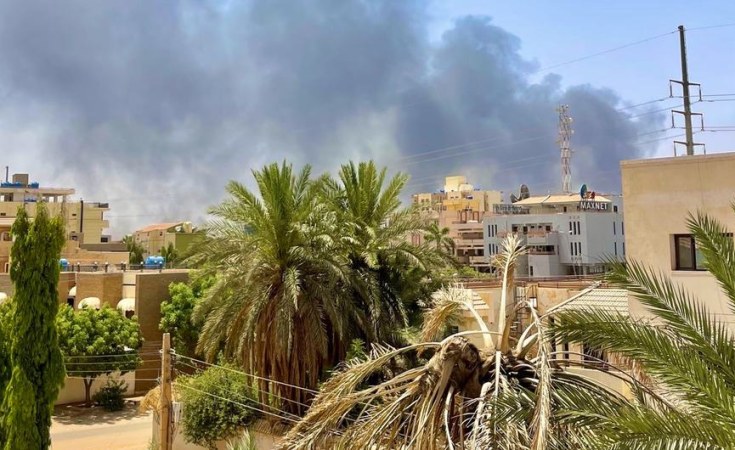Foreign countries rushed to evacuate their nationals from Sudan as fighting continued for a second week between forces loyal to rival army figures. Emergency flights were continuing early Monday, with hundreds of people flown out overnight on military aircraft.
Foreigners were also fleeing the capital Khartoum in a United Nations convoy, while millions of frightened residents took refuge in their homes.
Army and paramilitary troops have fought street battles in the capital since 15 April, leaving behind charred tanks, gutted buildings and looted shops.
More than 420 people have been killed and thousands injured, according to UN figures. There are fears of wider turmoil and a humanitarian disaster in what is one of the world's poorest nations.
Two French planes carrying around 200 people of different nationalities landed in Djibouti.
US special forces launched a rescue mission on Sunday for around 100 embassy staff and their relatives, swooping in with Chinook helicopters to fly the evacuees to a military base in Djibouti.
US military staff "will remain deployed in Djibouti to protect United States personnel and others until the security situation no longer requires their presence", President Joe Biden said Sunday in a letter to the Speaker of the House.
British Prime Minister Rishi Sunak said UK forces had also rescued diplomats and their families while Canadian Prime Minister Justin Trudeau said his country had temporarily suspended its evacuation operation.
"Our diplomats are safe, they are working from outside the country," Trudeau tweeted.
The German army said it had evacuated 101 people on the first of three military aircraft sent to Sudan. They have landed safely in Jordan.
Long convoys of UN vehicles and buses were seen leaving Khartoum heading east to Port Sudan on the Red Sea, 850 kilometres away, carrying "citizens from all over the world", according to one Sierra Leonean evacuee.
Fighters ignore calls for truce
The fighting broke out on 15 April between forces loyal to army chief Abdel Fattah al-Burhan and his deputy-turned-rival Mohamed Hamdan Daglo, who commands the powerful paramilitary Rapid Support Forces (RSF).
Daglo's RSF are former Janjaweed fighters.
The military toppled President Omatr al-Bashir in April 2019 following mass citizen protests.
The two generals jointly seized power in a 2021 coup, but fell out over the integration of the RSF into the regular army.
Multiple truces have been agreed in recent days; all have failed to stop the fighting.
Darfur hospitals overwhelmed
Fighting has broken out elsewhere across Sudan, Africa's third-largest nation.
Battles have raged in Darfur, where aid group Doctors Without Borders (MSF) said their medics had been "overwhelmed" by the number of patients with gunshot wounds, many of them children, in the city of El Fasher.
Some hospitals have been shelled and others ransacked, with more than two-thirds of medical facilities in Khartoum and neighbouring states "out of service", the national doctors' union said.
The scramble by foreigners to escape has heightened fears among Sudanese of what will happen when diplomats who could act as potential mediators have gone.
"Pushing for safe passages to evacuate internationals without simultaneously pushing to end the war will be terrible", said researcher Hamid Khalafallah.
"International actors will have less impact once they're out of country," he said, adding in a message to foreign nations: "Do all you can to leave safely, but don't leave the Sudanese people behind unprotected."


